Hellenistic witch centric acct, some other pantheons aswell || any neos/pronouns, 20 || system owned acct || follows/likes from @chaoticpiglinwitch
Last active 4 hours ago
Don't wanna be here? Send us removal request.
Text
The consensual ‘abduction’ of Persephone in Lokri

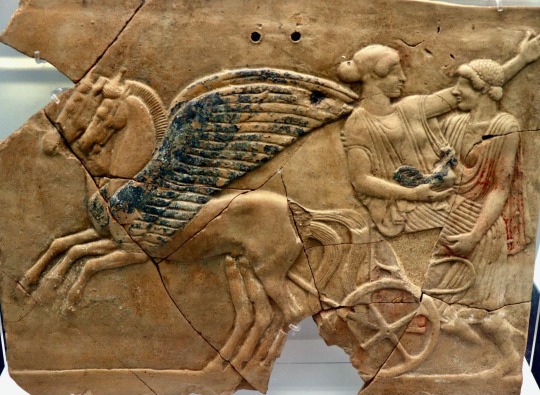
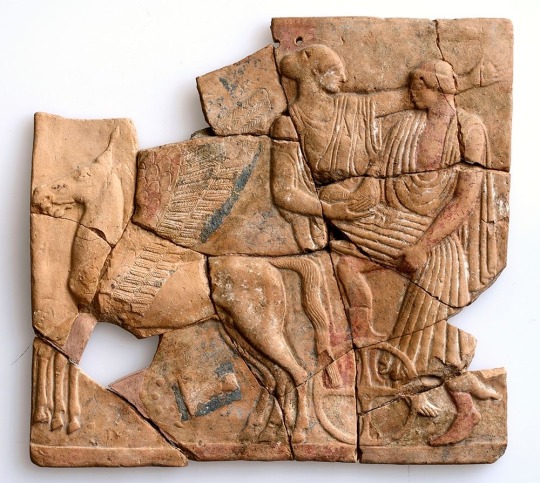
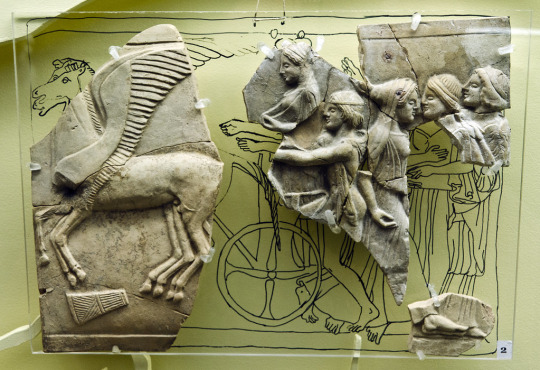
Pinakes of Persephone driving the chariot or embracing Hades as he abducts her
A fun fact that I love about Persephone and Hades is that in the city of Lokri (Modern Italy), they were seen as the ideal marriage. Women who were about to get married re-interpreted the myth of the abduction of Persephone so it would reflect their current situation, e.g: Women who were happy with their future husband made a pinake (a tablet of painted wood or terracotta) where Persephone was driving the chariot and participating in her own ‘abduction’; On the contrary, women who were forced into their marriage would make a pinake where Persephone was fighting against her captor.
“The pinakes were most likely dedications made by young girls in the lead-up to their weddings. In this sense, it is understandable that the chosen god does not completely undergo the transition process. The dedications served the function of seeking Persephone's blessing and protection for their marriages, and they were dedicated before the marriage had taken place. So the image of the goddess that was being invoked and imitated in the abduction scenes was the goddess in the same state as the dedicating girls: the state immediately before marriage. […]
The most common pinax types are the 'divine' and 'imitation' scenes. In both cases, these range from unambiguous abductions where the maiden clearly struggles against her captor to images in which it appears the girl is complicit in her own kidnapping sometimes even taking charge of the chariot herself. The range can be accounted for because, as James Redfield points out, "no doubt some brides felt more abducted than others".”
- Mackin, Ellie. “Girls Playing Persephone (in Marriage and Death).” Mnemosyne 71, no. 2 (2018): 209–28.
3K notes
·
View notes
Text
Persephone Offerings and Devotional Acts
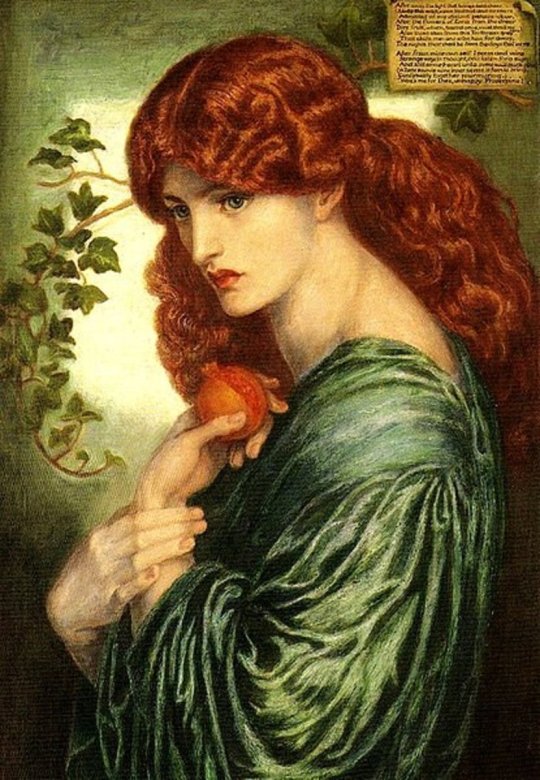
Offerings
As Queen of the Underworld:
Pomegranates/seeds/juice/imagery
Skull imagery
Red wine
Bones
Crystals/Gems
Coins/Money
Dirt/soil
Preserved/taxidermized animals
Grave rubbings
Mementos of deceased loved ones
Urns
As a Nature Goddess:
Seeds
Flowers
Dried/pressed flower petals
Produce
Fallen leaves
Grains/breads
Cool rocks
Butterfly wings/imagery
Herbs
Snake skin
House plants
Myrtle (an offering Dionysus brought for her when he journeyed to the Underworld to retrieve his mother)
Snow from the first snowfall
Spring rain
Pig imagery
Snake imagery
As a Mother/Marriage Goddess:
Some traditions worshipped Persephone as a goddess of marriage and motherhood. Her marriage to Hades represented a young maiden being married off to an older man. The change was scary for both the mother and the maiden, but necessary in their society. Women asked for Persephone to bless their wedding garments and children were dedicated to Persephone. I feel traces of this belief remain in modern worship as many worshippers feel Persephone is a motherly figure alongside Hades as a fatherly figure.
Wedding mementos
Childhood mementos
Marriage garments
Family scrapbooks
Family heirlooms
Wedding rings
Baby shower mementos
Devotional Acts
As Queen of the Underworld
Write your post-death wishes down
Learn about different options for burial/cremation
Clean bones
Walk through cemeteries
Visit graves of loved ones
Clean graves (with permission and appropriate knowledge)
Adorn graves of loved ones
Sit with old gravestones
Bury dead animals you find in the woods
Decorate/paint bones
Track your finances
Save money
Donate to others if you have the means
Shadow work about life and death
As a Nature Goddess:
Join a community garden
Start a garden
Make flower crowns
Keep an outdoor altar
Take a nature walk/hike
Meditate outside
Study herbology/herbalism
Support local farmers/artisans
Go to a farmer's market
Get lost in the woods
Honor the seasons
Walk barefoot outside
As a Mother/Marriage Goddess
Call important women in your life
Cook a homemade meal and share it with others
Care/provide for your family
Be nice and caring toward children
Shadow work about your family, especially your mother
Build community
Support new parents
Check in with your friends when they have big life events, such as moving or a marriage
Make a scrapbook
162 notes
·
View notes
Text


Offerings for the lovely Persephone - one for being the Queen of the Underworld, and another for her being the Goddess of Spring 🫶 I love her duality
54 notes
·
View notes
Note
Hello!
I've been devoted to Apollo for some time now, but I haven't been able to find sources that can clearly explain to me his festivals/holidays and how to celebrate them.
I'm coming from Wicca (as that's all I was exposed to in terms of spirituality, previously), but I feel that its never worked for me. Hellenism seems like a nicer fit, as I'm already interested in the history of the time and I feel connected to the Theoi (especially Apollo) already.
As I'm finding myself in my spiritual journey and figuring things out, I do feel that slowly transitioning (maybe one deity at a time) will be for the best; especially since I'm still young and don't have all the time in the world.
Anyway ! To get to the point (I'm sorry for being all over the place), I was previously celebrating the Wiccan wheel of the year in a more Apollo-centric way, but I would like help finding information on His real festivals and holidays.
I'm sorry if you've gotten a similar ask, or if you've talked about this already! Thank you for this blog, its helped me a lot !!
Hi there!
I was planning to make a post about his festivals anyway, so here we go!
Apollo's festivals
We probably have the most detailed accounts of Attic/Athenian and Panhellenic festivals when it comes to most gods. Of course, other festivals such as regional ones did exist and I could mention some of them and the scarce bits and pieces of information that have survived but in this post I will focus on festivals and celebrations we know a little more about - some of the ones we could celebrate nowadays or even attempt to reconstruct. There were plenty of festivals celebrating different gods and Apollo had quite a few of his own but I think this will be more useful in terms of modern religion.
I will briefly talk about the history, how the festivals were celebrated back in ancient times and what we could do nowadays. Don't stress if you don't have access to some of the things listed as offerings. These are only my suggestions and things that could especially be associated with each festival. It's fine to offer something else.
So, let's go over some main festivals of Apollo:
Just a PSA: you don't have to celebrate all of them
Pythian Games - Panhellenic; every four years - during the third year of each Olympiad
History: The games were said to have been established shortly after Apollo killed Python and set up the oracle at Delphi. They were also meant to commemrate those events.
Celebration: involved various athletic (foot & chariot races) and musical competitions. The winners received a wreath of bay laurels from the city of Tempe in Thessaly.
What could we do nowadays: Offerings - wine, oilve oil, laurel; watch sport/musical competitions on the TV or attend an event like that; physical activity, listen to music, sing, write songs/poetry
Pyanopsia/Pyanepsia - Athenian; 7th day of Pyanopsion (around October)
Gods: Apollo, Helios, Horai
History: The origins of the festival are linked to the Athenian hero Theseus was said to have established the celebration to thank Apollo and commemorate his victory over the Minotaur.
Celebration: Rites incorporated remnants of rustic magic, including two offerings, consisting of a hodgepodge of the pulse (edible seeds) and a branch of olive or laurel bound with wool, around which were hung fruits of the season, pastries, and small jars of honey, oil, and wine. The offerings were carried to the Temple of Apollo, where they were suspended on the gate. The doors of private houses were similarly adorned. Children carried Eiresione [Ειρεσιώνη] - a wand of laurel. They were going from house to house singing. It's possible that in exchange for Eiresione, the children received small gifts. Eiresione was said to bring good luck over the year if fixed above the door.
What could we do nowadays: Offerings - especially seeds from the legume family, grains, honey, wine, olive oil, fruit, incense, laurel & olive branches/leaves; singing, celebrating with your loved ones (if you can), prayer/hymns, exchanging small gifts, hanging a laurel/olive branch over the door
Delphinia - Athenian; also celebrated in various other parts of Greece; 6th Mounychion (around April)
Gods: Apollo & Artemis
History: Again, connected to Theseus
Celebration: involved a procession to the Delphinion (the shrine) where both Apollo and Artemis were worshipped. Seven boys and seven girls carried olive branches, bound with white wool. There's a possibility Apollo was also honoured as a god having influence on the sea.
What could we do nowadays: Offerings - especially olive oil, olive branches/leaves, water, saltwater, wine, incense; going on a walk - especially somewhere by the sea or a river; prayer/hymns
Gynmopedia - Spartan; annual (around the 6th to the 10th of July)
Gods: Apollo, Artemis & Leto
History: might've begun in 668 BCE to honour a Spartan victory in Thyrea. Apparently, it's possible that Lacedaemonians took it "more seriously than any other festival". It was the first public gathering of the new year.
Celebration: it featured enerations of naked Spartan men participating in war dancing and choral singing, basically it was an exhibition of all kinds of accomplishments in gymnastics, music, and dancing. They would honour Apollo through songs and performed songs which represented the phases of life. The leader of each chorus group would wear a headpiece known as the "feather crown" made of palm leaves.
What could we do nowadays: Offerings - palm leaves; dance, singing, blasting music, physical activity, celebrate with your loved ones (if you can), reflect on life a bit
Hyacinthia - Spartan (+Amyclae); three-day & annual (probably early summer)
Gods: Apollo & Hyacinthus
History: Based on mythology. Held in honour of the Spartan youth, Hyacinthus who was a lover of Apollo.
Celebration: Athletic contests were held to commemorate Hyacinthus' death (killed with a miscast discus). The rites gradually passed from mourning for Hyacinthus to rejoicing in the majesty of Apollo. It's probable the festival was connected with vegetation and might've marked the passage between spring and summer.
What could we do nowadays: Offerings - flowers, incense, grains; physical activity, prayer/hymns, take some time to appreciate the people in your life, read the myth about Hyacinthus
Karneia - Spartan, 7th (Attic) Metageitnion/(Spartan) Karneios (around August)
Gods: Apollo (Karneios)
History: Due to the sacred law, the festival was the reason why Spartans did not help the Athenians in the Marathon battle.
Celebration: Five young men were chosen out of each tribe; one man, decked with garlands, ran away, and the rest followed him. The festival might've been connected to vegetation and fertility.
What could we do nowadays: Offerings - flowers, grains, fruit; prayer/hymns, physical acrivity (go for a jog/play tag?), spend some time outside, learn about the Battle of Marathon
Thargelia - Athenian; (pretty important festival), annual 6th & 7th of Thargelion (around May)
Gods: Artemis & Apollo
History: held on birthdays of Artemis & Apollo; sometimes it might've involved human sacrifice, especially in it's early days
Celebration: vegetation ritual; It was common to offerthe first-fruits of the earth to the gods. The first day involved a purifying and expiatory ceremony. On the second day of the festival there was a feast and procession as a mark of thanksgiving. Branches of olive bound with wool, borne by children, were affixed by them to the doors of the houses (pretty much the same thing as during Pyanopsia). Musical contests were also common on the second day.
What could we do nowadays: Offerings - grains, bread, honey cakes, all kinds of fruit (especially figs), honey, wine, olive oil, incense, olive branches/leaves; prayer/hymns, plan a purification ritual/activity (it could even involve things like: cleaning your house, taking a bath, etc.), make dinner and invite friends/loved ones to share it with, sing and listen to music.
Apollo is also honoured during:
Noumenia (new moon) under his epithet Noumenios
The 7th day of each month
During Summer/Winter Solistice (his arrival from/deparure to Hyperborea, marking the change in seasons, if you follow the myth)
Some things that might also be useful:
Here's an example of "Greek Wheel of The Year":
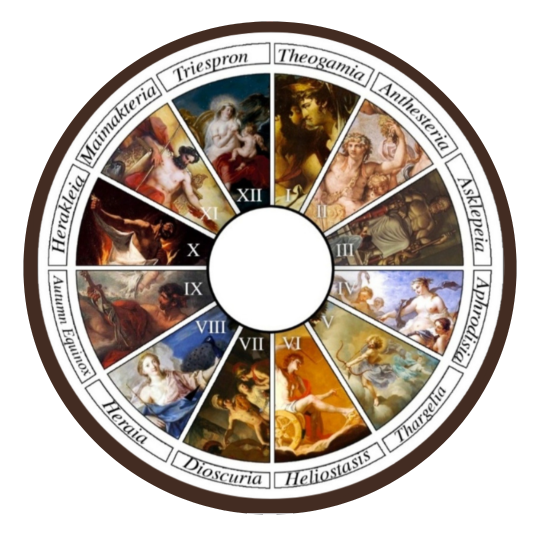
It's a simplified diagram showing some main Hellenic holidays. You can find more info on the website (link above). Of course, this is not the only way to celebrate Hellenic festivals but since you mentioned the Wiccan Wheel of The Year, I figured it could be easier to picture or get used to.
Attic Callendar 2022 - a reconstruction of the Attic (lunar) calendar; days marked for specific festivals and to honour certain deities [FYI Hellenion is kinda problematic, though, so keep that in mind - see more about that here & here ]
Ancient Greek Fesivals - summaries
You can also create a personal, UPG-based festival/holiday! @theoi-crow explains it really well in this post - LINK
I might write a short post about other fesivals for/involving Apollo, such as Stepterion because I think it's particulary interesting but could be difficult to celebrate today. It's more of a bonus, so I'll just link it here once I'm done.
Hope this will be helpful!
681 notes
·
View notes
Text
leto, goddess of motherhood 🍼
───── ⋆⋅☆⋅⋆ ─────

───── ⋆⋅☆⋅⋆ ─────
10 notes
·
View notes
Text
Pillars of Hellenic Paganism
Arête (ἀρετή)
To strive for excellence in matters of body, soul, and spiritual devotion. The pursuit of virtue, morality, excellence to one's fullest potential.
Eusebia (εὐσέβεια)
To be pious and have a deep reverence and respect for the Theoi.
Hagneia (ἁγνεία)
To be ritually pure. Associated with the cleansing of lyma and/or miasma before approaching the Theoi.
Kharis (Χάρις)
To give offerings to the Theoi with gratitude, devotion, and willingness. Also the personal, reciprocal relationship between the worshipper and the Theoi.
Xenia (ξενία)
To show hospitality and generosity towards all. Also to receive hospitality and generosity with courtesy and reciprocity.
Sophia (Σοφία)
The pursuit of wisdom, knowledge, and deep understanding. Note that Sophia is not a goddess or a divine personification of wisdom, it is a principle.
Sophrosyne (σωφροσύνη)
To exercise self-control, moderation, and mindfulness.
Nomos Arkhaios (Νόμος Ἀρχαιος)
To observe and adhere to traditional ancient customs and religious law.

248 notes
·
View notes
Text
𝐒𝐩𝐫𝐢𝐧𝐠 𝐟𝐥𝐨𝐰𝐞𝐫𝐬 𝐚𝐬𝐬𝐨𝐜𝐢𝐚𝐭𝐞𝐝 𝐰𝐢𝐭𝐡 𝐝𝐞𝐢𝐭𝐢𝐞𝐬 𓇢𓆸

Peony: Asclepius, Aion, Apollo, Leto, Aphrodite
Crocus: Hermes, Brigid, Tyche, Zeus, Persephone, Hekate, Mercury, Aurora, Eos, Artemis
Asphodel: Hades, Persephone, Hekate
Columbine: Aphrodite, Venus, Freyja, Baldr
Flowering Quince: Aphrodite, Venus
Hellebore: Dionysus, Helle, Saturn, Loki, Hekate
Henbane: Hekate, Apollo, Artemis, Saturn
Pansy: Thoth, Hermes, Zeus, Venus, Aphrodite, Persephone
Dandelion: Brigid, Aphrodite, Hecate, Loki, Belenus, Hermes, Helios, Artio
Grape Hyacinth: Dionysus, Hyacinthus
Snowdrops: Brigid, Persephone, Freyja, Aphrodite, Nanna
Forget-me-not: Zeus, Freyja, Aphrodite (named „mouse ear” by her), Adonis
Magnolia: Artemis, Selene, Aphrodite, Kala
Bluebell: Selene, Hermes, Hekate
Lily of the Valley: Apollo, Asculapius, Maia, Mercury, Ostara, Skadi, Baldrr, Artemis
Primrose: Bertha, Brigid, Freyja
Hyacinth: Apollo, Zephyrus, Tyche, Hyacinthus, Quetzalcoatl, Yemaya, Dionysus
Anemone: Aphrodite, Adonis, Blodeuwedd, Artemis, Loki
Lilac: Pan, Venus, Sigyn, Dionysus
Chamomile: Tyche, Hermes, Ra, Helios, Mercury, Hestia, Oshun, Baldr, Hephaestus
Iris: Persephone, Iris, Hera, Juno, Horus, Isis
Easter Lily: Áine, Ostara
Azalea: Persephone, Artemis, Aphrodite
Tulip: Flora, Dionysus, Anahita, Eros, Lilith, Nyx
Gardenia Morpheus, Athena, Artemis, Selene
Lily: Persephone, Morrigan, Hera, Cybele, Artemis, Lilith, Thanatos
Daffodil/Narcissus: Apollo, Narcissus, Persephone, Tyche, Hades, Thanatos
Foxglove: Freyja, Flora, Juno, Dionysus, Áine, Cernunnos, Saturn
Jasmine: Lakshmi, Aphrodite, Vishnu, Selene, Morpheus, Tyche, Hermes, Hel
Wisteria: Dionysus, Hermes, Kanayago, Mercury
Larkspur (Delphinium): Apollo, Persephone, Zephyrus, Freyja, Aphrodite, Poseidon
Phlox: Eros, Demeter, Hestia, Dionysus
Poppy: Thanatos, Demeter, Ceres, Morpheus, Ares, Dionysus
Violet: Ares, Aphrodite, Io, Orpheus, Venus, Attis, Persephone, Priapus, Polukleitos , Dionysus
Carnation: Artemis, Diana, Zeus, Odin
Daisy: Brigid, Aphrodite, Freyja, Venus, Selene, Cernunnos, Hermes, Ostara
⠂⠄⠄⠂⠁⠁⠂⠄⠄⠂⠁⠁⠂⠄⠄⠂⠄⠄⠂⠂⠄⠄⠂⠁⠁⠂⠄⠄⠂⠁⠁
⠂⠄⠄⠂⠁⠁⠂⠄⠄⠂⠁⠁⠂⠄⠄⠂⠄⠄⠂⠂⠄⠄⠂⠁⠁⠂⠄⠄⠂⠁⠁
Note about this post! These aren’t all the spring flowers, just the ones I have more knowledge about and personal experience with. This list is mostly based on my own interpretation and how I’ve come to associate certain flowers with specific deities throughout my journey as a pagan witch. I’m aware there are many other deities connected to flowers, but these are the ones that came to mind while I was taking notes. I also want to mention that color is probably one of the most important aspects when it comes to associating flowers with deities. For example, Lady Athena is connected with all white flowers, Lady Aphrodite with pink ones, and Dionysus with any purple flower. Elements also play a role, flowers carry elemental energy that can deepen their symbolism or connection to a deity. There are goddesses from different religions who are patrons of flowers and vegetation, like Flora, Chloris, and others, and they’re basically associated with all flowers, so I didn’t include them here since it felt kind of obvious. Whether a flower is traditionally associated with a deity or not, I just want to say, flowers make beautiful offerings, and your deities will absolutely appreciate any plant you choose to give them :D
227 notes
·
View notes
Text
Leto Epithets
One of the many mother goddesses found in the Hellenic pantheon, she is also one of (three) goddesses directly of motherhood along with Rheia and Maia. Her origins are debated, but it is a fact that she is an established goddess as far back as the Mycenaean era (pre-Apollon btw! More than likely Leto and Artemis were regarded as mother and daughter by then) under the name ra-ti-jo / ra-to (Latios/Lato). The late myth of the birth of Artemis and Apollon where she runs from Hera might showcase a bit of history of her leaving Greece and going to Turkey (Anatolia) in the way a lot of myths do with cult history and practices expanding. I say this because the connection to Lycia as her origin as explained in the further reading section is pretty late into the timeline of her existence and her main temple there is also a late addition when she was long pre-established as a goddess in Greece before it was made. Anything else saying she derived from another goddess is purely speculation and is more than likely disproven by this point in time in the year 2024. (Please note that this doesn't mean she possibly came from somewhere else before records, just that she existed in Mycenaean Greece).
Alphabetically it's a mess, but everything that I've added to go along with aspects, domains, traits, and animals of hers have an asterisk by them, not necessarily upg but innovating what's already historically attested to her.
A remake of my ancient, years-old post. Of great kindness She who is gentle and modest Preumenḗs: soft of temper, gentle, gracious, favorable Epieikḗs: Morally reasonable, fair, kind, gentle, good Ever mild and gentle Mild from the beginning Of womanly demure *Ēpiócheir: With Soothing Hand *Phainô: Appear, Reveal, Shine Lêthô/Lanthanô/Lelathon: To escape notice, To cause to forget, Move unseen, Go unobserved *Aisthánomai: perceive, apprehend by the senses or of mental perception, perceive, understand, take notice of, to have perception of *Aísthēsis: Perception from the senses, feeling, hearing, seeing. Perception by the intellect as well as the senses. Ability to perceive: discernment. Cognition or discernment of moral discernment in ethical matters *Ablepsíā: blindness, failure to see (something), invisibility *Ágnoia: The state of not knowing or perceiving: ignorance, unawareness *Hḗsukhos: quiet, still, calm, gentle, moderate, (of persons) cautious, (of the voice) gentle *Hēsukházō: To be still or quiet, Be at rest *Hēsukhíā: (Of) Silence, Stillness, Quiet *Apokalúptō: To reveal. Leto is an ocular/prophetic goddess just like Apollon that speaks with a voice from above, working through light in effect, the implication is that she (like Apollon) has it tied to day for when they work as it's noted that Asteria and Hekate prophecy through/by/at night and from below. (Leto might double as a night-time goddess, but the connection to day is more solidified). Lykeiê: Of the wolves *Ameibousa: One that transforms, in the spirit of One who brings forth transitions Ethelímona: Willing (to answer those that pray to her) Dark-gowned (I really wish I was able to find a translation for this one) *Khrysôpis: With Golden eyes, With a golden face, Golden-faced Kyanopeplos: Dark-veiled, Cloaked Most Glorious Eukomos: Lovely-haired Kallisphyros: Beautiful/Trim/Neat-ankled Aidoios/Semnê Thea: August Goddess Khrysêlakatos: Of the Gold Spindle (Distaff) *Hêmerasia: She who soothes *Meilikhios: Gentle, Soothing *Phaesphoros: Light-bringer *Hilaeira: Softly-shining *Alektor: Rooster Polykleitos: Far-famed Xanthê: Blonde/Golden-Haired, Gold-tressed Phytie/Phystiê: Grafter Koiantis/Koiêis: daughter of Koios Koiogeneia/Koiogenês: born of Koios Lykios: patron goddess of Lykia Euteknos: Of Fair Children Gentlest in all Olympos *Pheraia: Of the Beasts *Agroterê: Of the Hunt, Huntress
*Most of these are ones I had to comb through literature to find, a couple of UPG names and ones I’ve found or created (as a reference) through other research
Further reading:
Some Cults of Greek Goddesses and Female Daemons of Oriental Origin by Butzon & Bercker
Theoi.com's Koios page for the information at the end
Mothers of the Sun - Myth and Legacy of the Minoan "Solar Mother" in Classical Greek Mythology
The Cities and Bishoprics of Phrygia, being an Essay of The Local History of Phrygia from the Earliest Times to the Turkish Conquest
53 notes
·
View notes
Note
what do you think of the story of Leto helping someone transition?
Leto is the goddess of childbirth and motherhood and a goddess who is very gentle. She is even described as «εθελήμονα», always willing to help those who need her. She is very maternal and of assistance to whoever asks her for help.
Societies in Ancient Greece were deeply, Deeply misogynistic. Case in point, Cretan man Lamprus threatened his wife Galatea by saying that she will either birth for him a son or he will kill the child. Unfortunately, Galatea gave birth to a baby girl. As any mother would in order to protect the life of her child, Galatea concealed this from her husband and the world, naming the child Leucippus — meaning “white horse”, something that often symbolises beauty and also the triumph over negative forces in myth — and raising it as a male child. As luck would have it though, with each passing year Leucippus was said to be growing to be more and more beautiful and also resembling his birth sex more and more. Seeing this and fearing for both of their lives, his mother begged Leto to change his sex. As the goddess of motherhood and as a merciful, caring goddess, Leto changed the sex of Leucippus, saving his and his mother’s lives.
I presume this was supposed to be some kind of “gotcha” because some weirdo has been harrassing me in my asks, but I genuinely do not understand what exactly this is. As if I would not know my own mythology, my own culture and religion that generations of my family were raised in and that I have spent my hours reading about and practicing.
If you find yourself drawn to and reflected in a specific myth, great; myths are supposed to be interpreted in a multitude of ways, and who am I to police your faith. That being said, be respectful about the history and culture these myths come from. The simplification of a myth that talks about the targeted murder of female children, a story about a mother’s desperate plead to goddess Leto for her and her female child’s survival into one about “Leto helping someone transition” explicitly erases my history and the context of my religion; this is not only tone-deaf but downright insulting. The grave dangers that misogyny posed and still poses cannot and should not be overwritten. Such myths were born of a lot of suffering and, especially as somebody who was maybe not brought up in a similar culture, you need to understand the context of the religion you are taking interest in, as well as the gravity of issues such as female infanticide — still prevalent today.
37 notes
·
View notes
Text
resistance with lady hestia
make your own soap - adding lavender oil, rosemary
use wooden cleaning tools
buy from local farmers/farmers market
grow your own herbs and trying to grow your own veggies and fruits in pots and containers
use all your hygiene products to the last drop
use a wooden hairbrush or a comb, write/paint/engrave your name on it
crochet/knit/sew pouches and grocery bags
be gentle with the things you own now
learn how to make sourdough and bake your own bread
check the creators you follow and support, unfollow/block awful people
thrift for clothes and furniture/decor
learn to sew/flip your clothes
196 notes
·
View notes
Note
Hello again! 🌕🪐After a few days, I've kinda forgotten about prayers and offerings :') I'm assuming this is alright, with all the information I've read about the Gods being patient, compassionate, and understanding.
I've mostly just shared tidbits of snacks and food, though most of the time I usually forget until I've had the last bite... I end up feeling a little guilty.
I also know with Ouranic Gods I can also eat the offerings afterwards; but how do I actually do this correctly/respectfully? Should I wait a certain amount of time? Say something? It feels so rude to just pick up the plate and take it away.
I do this too. Forgetting prayer and offerings always makes me feel awful. But yeah, the gods get it.
For food offerings, I usually say “with the first and last to Lady Hestia, <god name + epithet the differing is for>, I offer this to you. Take your fill and I’ll eat the rest”
I include Hestia because, since she was the first to be eaten by Cronos and the last to be thrown back up, we the first and last bite of all food offerings to her.
24 notes
·
View notes
Text
lady hestia & lord hermes
"Ancient Greek Cults" Jennifer Larson
Hestia’s special relationship with Hermes is recognized in the Homeric Hymn to Hestia, where the two are invoked as dear friends who dwell in and protect the house together. Both are the objects of domestic cult and both are concerned, more than the other gods, with the doings of epichthonioi, those “who live on the surface of the earth.” Also present in this pairing is an implicit recognition of the way the two deities govern gendered space and movement in relation to the home. Hestia, the most immobile of goddesses, marks and anchors the center of the home, just as the women of the house ideally remain indoors and aloof from contact with strangers. Conversely, Hermes guards the door and governs movement in and out, just as the masculine role is to work under the sun and deal with strangers. Iconographic convention also linked these two gods. They appeared as a pair, for example, on the altar of Amphiaraos at Oropos and on the statue base of Pheidias’ Olympian Zeus.
81 notes
·
View notes
Text
It’s Mother’s Day here in England and my actual mum is working so since I can’t spend time with her today I’d like to talk about some of my favourite motherhood myths of Greek mythology! This’ll only include the goddesses, though — sorry Penelope, Clytemnestra, Deidamia and Danaë </3
Thetis and Achilles
The Song of Achilles ruined Thetis’s reputation, in this essay I will—
This is an experience applicable to that of a mother whose child is suffering from a terminal illness. She knows, especially once Achilles is in Troy, that Her child is going to die and there is nothing She can do to stop it. She has known that for most of his life, but it became more real by the time we get to the Iliad, and Thetis spends the whole book in mourning.
She frequently brings up the fact that She must be the least respected goddess of all of them, because She was forced into marrying a mortal man, when the other gods knew he would die, as would any offspring they had together, and Thetis would be alone. Peleus is old at the time of the Iliad, and Thetis stays at the bottom of the ocean by the Greek War Camp in Troy rather than in Her own home, because She can’t bear to see old age take him.
She went to so many lengths to protect this son she loved so much, going as far as to dip him into the River Styx in the hopes he wouldn’t die. And it was all in vain.
And yet, She loves that boy endlessly. Every time She appears in The Iliad it is to be there for Her son, to do everything She can to make sure that his last days are joyous instead of miserable. She’s grieving someone who isn’t even dead yet. She’d already given Achilles the urn that She wanted him to rest in once he was gone.
And the only reason this is Her fate is because there was a prophecy that Her son would outdo his father, and Poseidon and Zeus (who’d previously both wanted to make love to Her) didn’t want to be outdone, obviously, so they had Her marry a mortal man.
Athena and Erichthonius
So in this myth, Athena was pursued by Hephaestus who was upset over His divorce from Aphrodite and Her affair and such. Athena, being the virgin goddess that She is, wanted nothing to do with any of it and fled. He managed to get to Her and ‘dropped His seed’ on Her leg. She wiped it off in disgust and didn’t realise that in doing so, Gaia became pregnant with Erichthonius.
Gaia of course didn’t want to raise this child and gave him back to Athena, who raised him herself in Athens, where he later became King and started the Panathenia festival and built Her statue in the Acropolis.
Athena, for this myth, is sometimes regarded to have a very specific relationship with motherhood in that She raises those born under unusual circumstances. Ericthonius being one example, She also in some versions helped Leto with the birth of Apollo.
Demeter and Persephone
You can’t make a post about divine mothers and not include Demeter. I hate the way this myth is retold in the modern day trying to either basically write out Demeter or make Her a horrible mother who is just overprotective.
This myth can exist without it demonising any party involved. This is one of our death myths about death taking a young person before their time, leading to insatiable grief for Demeter. It represents how the death of a child affects their mother and as someone whose had a sibling die, being able to see my own mother reflected in the gods (particularly Hera and Demeter) is genuinely beautiful to me.
But this myth is also written on the context of the Ancient world in which it was common that mothers and daughters would be separated by marriage without their consent. Hades is taking Persephone, but Demeter is a goddess, so She has the power to get Her daughter back, which most of the mortal women of the time would not have been able to do.
Nobody has to be a villain here — Demeter’s grief is understandable and allowed to exist. Persephone is allowed to be scared. But Hades and Zeus are not in the wrong either, necessarily; they’re going along with the status quo. And in Hades’s case, going with the death metaphor, that really isn’t His fault.
In this myth I think it’s notable that, as far as I’m aware, Persephone is okay. It was a rocky start but She’s respected as Queen of the Underworld and is incredibly powerful. That surely must have been reassuring for women in antiquity who were terrified of what marriage would be like, to know that it could be fine.
Fun fact: apparently girls in Ancient Greece who died before marriage would be called Brides of Hades.
Nemesis and Helen
In most versions of the myth, Helen’s mother is Leda, queen of Sparta, wife of Tyndareus. But others have her mother as Nemesis, the goddess of Divine Retribution.
I personally love the version of Helen with this parentage because of the implications it has on the fate of Troy. Helen, the supposed cause of the Trojan War (which was fated to happen) is the product of The King of the Gods, and the Goddess who balances the scales of good and bad fortune. Basically suggesting that Helen was always going to be a significant figure in the game of fate. Additionally, if we look specifically at Nemesis’s vengeance and how She punishes acts of hubris, plus Zeus’s domains over Xenia rights, then Helen being kidnapped against Xenia and that leading to the downfall of Troy is also really interesting as an aspect of her parentage — like she is the embodiment of a punishment for Xenia not being adhered to.
However, I also want to talk about the myth itself in which Nemesis has Helen. In this She is chased by Zeus. In some versions, He is Her father, in others, she is the child of Nyx alone. Either way, Zeus took the form of a swan, while Nemesis took the form of a goose to escape Hum. (As a side note, Helen’s family has a lot of weird connections to seabirds and I’m so here for it.) Nemesis did not want to have a child with Zeus, but was forced into doing so anyway, and Helen was the result.
It means a lot to me that even the Goddess of Divine Retribution can, Herself, face suffering and hardships and be a victim. That idea that being a victim does not make you powerless, and that even the one in control of fortune isn’t immune to it, is something that can be incredibly reassuring.
In this version of the myth, Helen is still raised by Leda and Tyndareus, as Nemesis gives her up. Yet another aspect of motherhood that I find to be so important is that sometimes people are just not able, not prepared, or even do not want to be parents, and this is not wrong of them. It is also emphasised that, as much as what Nemesis experienced was cruel and She was not bad for giving Helen up, Helen herself is still the most beautiful mortal woman, and therefore it is not the fault of the child themselves what the circumstances of their birth were. Which is, of course, obvious. But it means a lot for it to portrayed.
Hera and Hephaestus
I know She’s often depicted as a cruel mother who is awful, but honestly most of the awful things She does are to the children Zeus had during His affairs, not Her own. Of course, there is Hephaestus, but He’s actually the one I wanted to talk about when it comes to my favourite myth of Hera and motherhood — shocking!
Unfortunately motherhood isn’t always sunshine and rainbows, and this myth demonstrates that. Hera was furious when Zeus had Athena, proof of another affair, and in vengeance decided to give birth to Her own child without His help too. Hephaestus was the result of that. There are ofc versions of Athena’s birth where Hephaestus already existed as He took the axe to Zeus’s head to free Her, but in those versions I’d guess Hephaestus was born after some other affair of Zeus.
I see Hera throwing Hephaestus from Olympus when She discovered He was disabled as a depiction of postpartum depression. It was common for a long time for a child born unhealthy to be seen as the fault of the mother, and since Hephaestus didn’t even have a father, there was nobody to blame but Hera. This would’ve caused Her so much shame, and didn’t prove the point she was trying to make against Zeus and Athena at all.
Perhaps She felt that if she’d failed already, there was no way she could give him a good life or show anyone what she’d done. So she threw him from Olympus not because she found him ugly, but because She was at such a low emotional point that She was sure it would be better for Him to not have to be raised by Her, and for Her to never need to think about Him again.
He was taken in by Thetis, who had been raised by Hera, so I also like to imagine Thetis looking after him FOR Hera’s sake, knowing She isn’t in the mental state to do so Herself.
Their relationship in The Iliad is so important to me because while Hephaestus is angry at spiteful about what Hera did to Him (and rightfully so!) they also have a few moments of genuine care for each other. And I love that, because parental relationships can be so complex.
69 notes
·
View notes
Text
Thesmophoria
~ 11-13 Pyanepsion ~
In celebration of Demeter Thesmophoros, Thesmophoria lasted three days, but five in Attica. It was a woman-only festival that excluded virgins. These women observed chasity for several days and fasted from certain foods. It is thought to celebrate Persephone's return from the Underworld.

The first day was called anodos (ascent) and kathodos (descent.) The festival was carried out by torchlight. Women used the act of yelling obscenities at each other, insulting their characters, to purify themselves and promote fertility.
Only the women who have observed this purification retrieved the thrown piglets that had been casted into the megaron chasm during Skirophoria. They also carried fertility items, such as pinecones and figures of dough (which took the form of snakes and male genitalia) that had also been thrown into the chasm. These piglets were then laid upon an altar and mixed with seed to bring about good crop. After, this mixture was sprinkled on the fields.
This ritual was thought to be a practice mirroring the kidnapping of Kore and the sorrow of Demeter.

The second day, nesteia, was a day of fasting. Women avoided eating foods related to Demeter such as pomegranates, wheat/grains, fruits, vegetables and honey. While the fasting lasted all three days, this day women avoided food all together. All the woman on this day sat upon the ground to mirror Demeter once Kore was kidnapped. The day ended in the yelling of obscenities once again.
The third day, kalligeneia (which translates to 'the fair birth') was a happy day of magic of fertility of the ground. Women prayed for their current and future children.
Traditional Offerings:
pork mixed with seeds
pinecones
fasting
libations to Demeter and Kore
Traditional Acts:
fasting
offerings to Demeter and Kore
chasity
purification by verbal obscenities
Khaire Demeter! Khaire Kore!
17 notes
·
View notes


